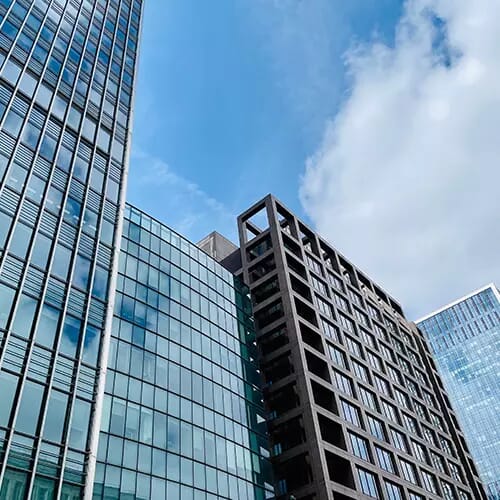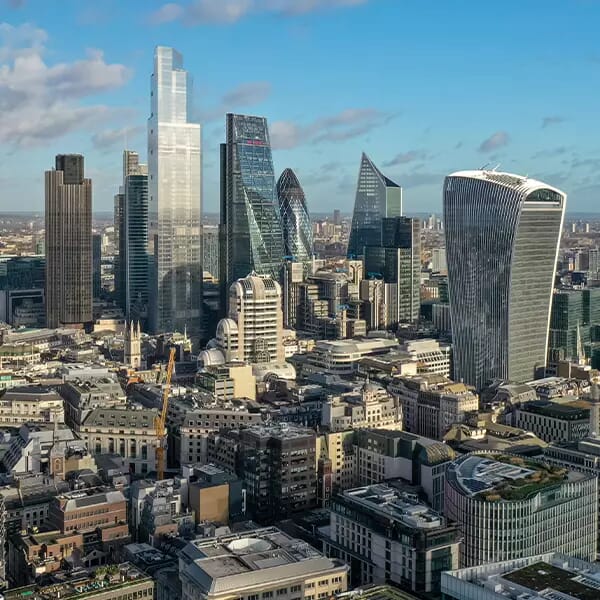 Credit: JJFarquitectos/ Envato
Credit: JJFarquitectos/ EnvatoInvestors brace for further interest rate volatility in UK real estate
Highest inflation rates in 40 years, gas crisis and lack of political leadership are leading UK to a mild recession
October 14, 2022Real Estate
The UK real estate market is facing a difficult time with interest rates and inflation further going up. In August, the inflation rate was 9.9%, one of the highest in 40 years, and economists expect it to rise through the remainder of 2022. This, combined with a political situation expecting to have a new government in 2 or 3 years, and with a complex macroeconomic situation, is leading the UK to a mild recession.
That and other matters were discussed at a Club Meeting last October 11th about the UK investments cycle with leaders from the real estate market.
For the members, the Bank of England (BoE) needs to increase the interest rates, currently at 2.25%, faster, even with the economy responding to the high demand in real estate.
Political volatility and speculation around Truss’ economic budget are causing doubts about the future of prime asset demand.
However, members agreed that they still saw the demand, and are underwriting deals with expectations that interest rates can drop off or stabilise. Yet the present overall worry is a stagflation scenario, what can real estate investors work with, if inflation continues to rise and the economy does not?
2023 might just be the year of Equity. Members see private equity groups skewing towards debt, as LP investors grow more insecure, and banks are retreating from project development risk. The discussion pointed out that 35-40 year loans will likely become the new normal.
Another problem that the city faces is Covid. If the industry needs to shut down in certain parts again, the furlough scheme can be brought back and this will have an impact on real estate prices. It is also expected that value adds offices will continue to see interest rising up in London, so it’s essential to transform older buildings into more energy-efficient stock.
Talking about energy-saving buildings, Savills shows that 79% of real estate agents agree that this topic has risen up the agenda over the past three months, aligned with the energy price cap announcement.
These points were addressed by real estate leaders in the Club Meeting. To be part of those discussions and be side-by-side with the most important names in the global real estate market, see our next events and be part of GRI Club.
Written by Gabriela Colicigno
That and other matters were discussed at a Club Meeting last October 11th about the UK investments cycle with leaders from the real estate market.
For the members, the Bank of England (BoE) needs to increase the interest rates, currently at 2.25%, faster, even with the economy responding to the high demand in real estate.
Political volatility and speculation around Truss’ economic budget are causing doubts about the future of prime asset demand.
However, members agreed that they still saw the demand, and are underwriting deals with expectations that interest rates can drop off or stabilise. Yet the present overall worry is a stagflation scenario, what can real estate investors work with, if inflation continues to rise and the economy does not?
2023 might just be the year of Equity. Members see private equity groups skewing towards debt, as LP investors grow more insecure, and banks are retreating from project development risk. The discussion pointed out that 35-40 year loans will likely become the new normal.
Can London still make sense as an investment destination in 2022?
Another important topic brought up in this club meeting was London pricing. There is a clear mismatch between demand, vacancy and soaring rental prices. Prime London rental growth reached 14% in the year to the end of September according to Savills.Another problem that the city faces is Covid. If the industry needs to shut down in certain parts again, the furlough scheme can be brought back and this will have an impact on real estate prices. It is also expected that value adds offices will continue to see interest rising up in London, so it’s essential to transform older buildings into more energy-efficient stock.
Talking about energy-saving buildings, Savills shows that 79% of real estate agents agree that this topic has risen up the agenda over the past three months, aligned with the energy price cap announcement.
The logistics sector
The majority agreed that logistics will be a resilient asset, yet as prices keep rising, bubbles are expected. Rising energy costs for tenants might further exacerbate this delicate rental imbalance and might cause adjustments in rental values, especially if Governments intervene with caps.These points were addressed by real estate leaders in the Club Meeting. To be part of those discussions and be side-by-side with the most important names in the global real estate market, see our next events and be part of GRI Club.
Written by Gabriela Colicigno



